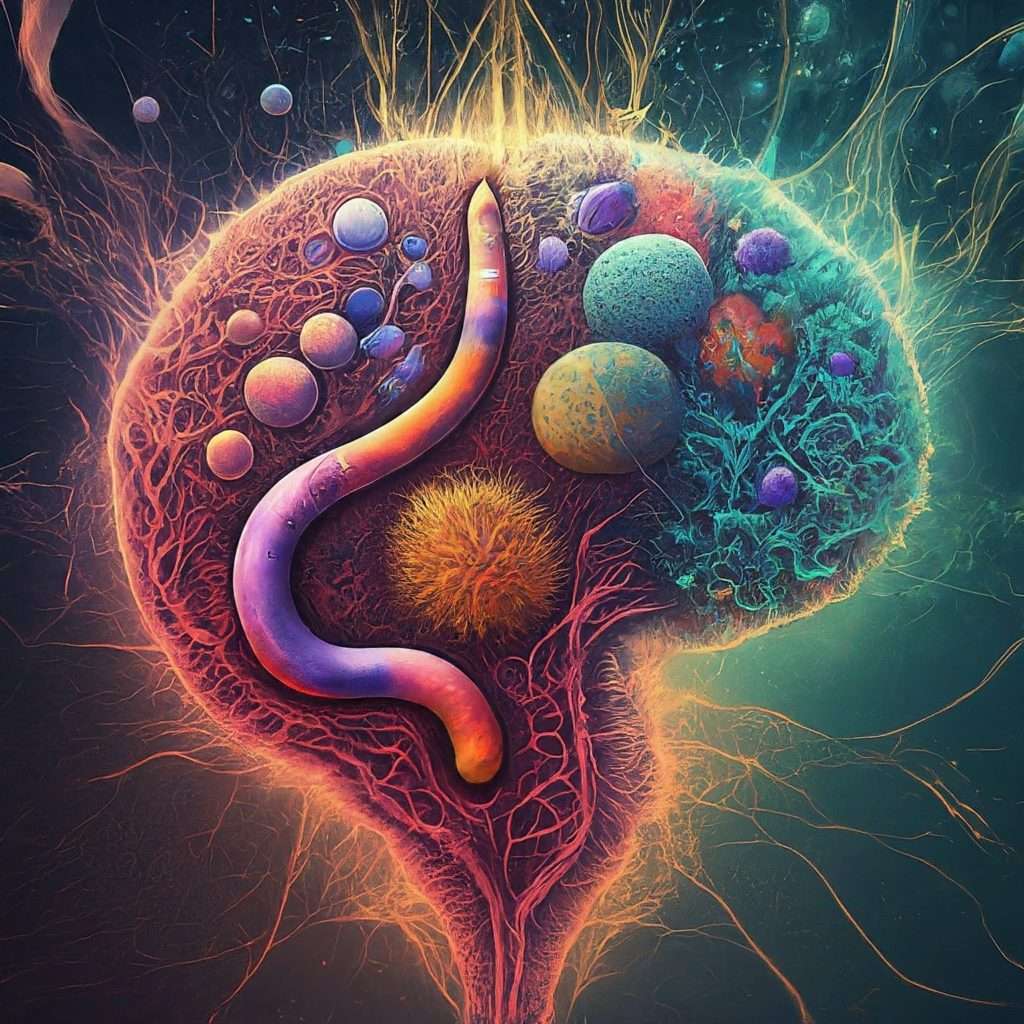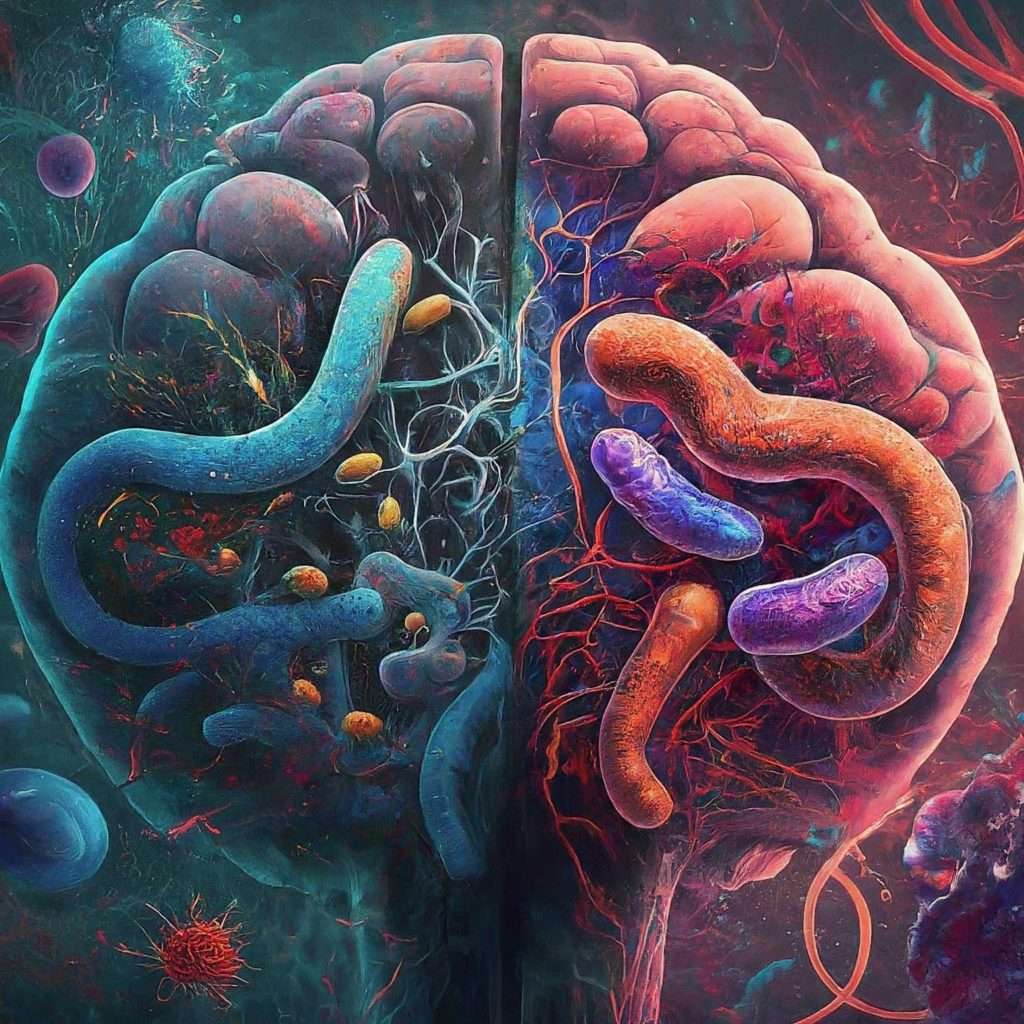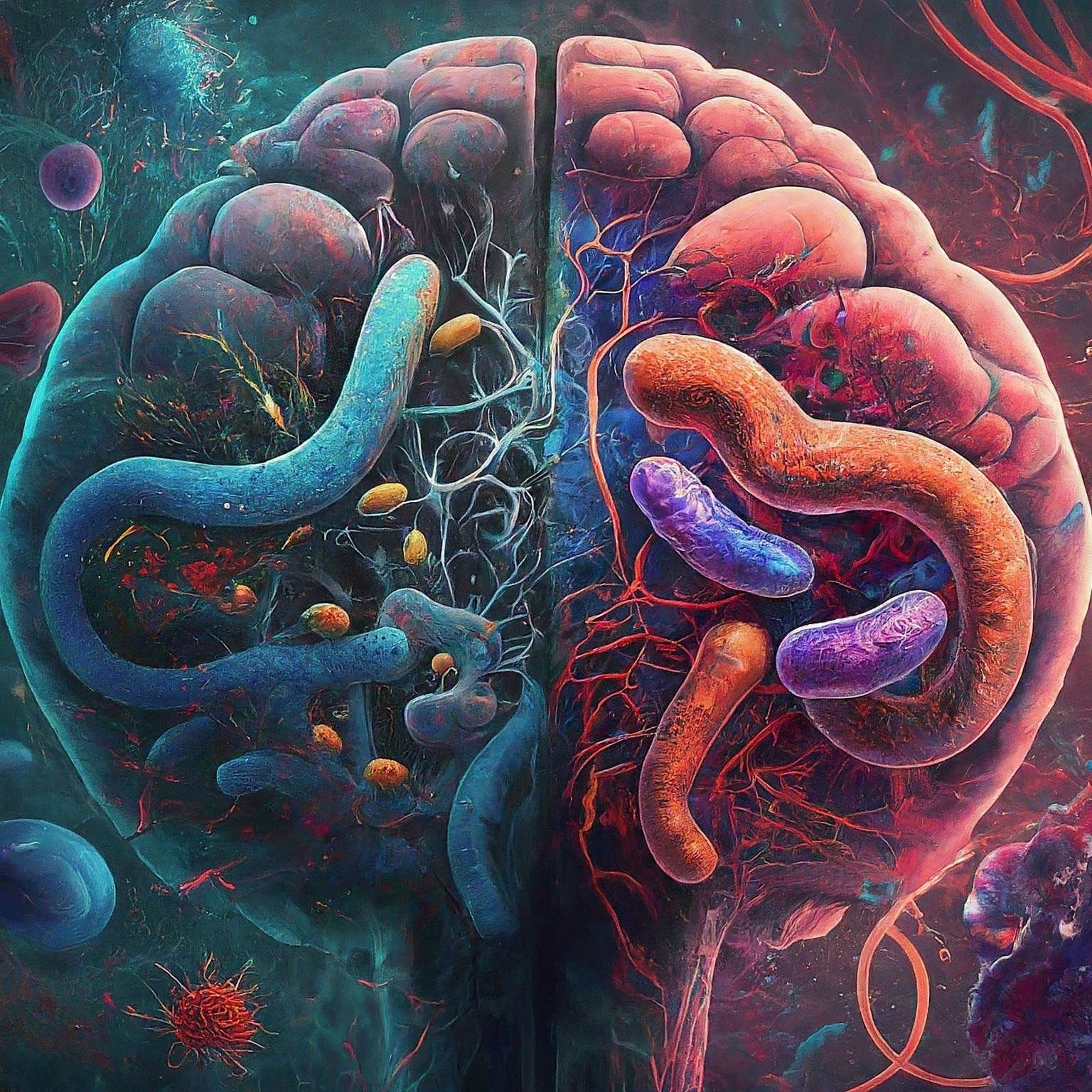The gut microbiome, the collection of trillions of microorganisms that live in our digestive tract, is more than just a part of our digestive system. It is a complex ecosystem that influences our immune system, metabolism, nutrition, and even our mood and mental health. In fact, the gut microbiome is often referred to as the “second brain” because of its close connection with the central nervous system.

However, the gut microbiome is not easy to study or understand. It is highly diverse, dynamic, and influenced by many factors, such as diet, lifestyle, genetics, and environment. Moreover, the gut microbiome is linked to various diseases and disorders, such as obesity, diabetes, inflammatory bowel disease, and depression. Therefore, there is a need for advanced tools and methods to analyze the gut microbiome and its role in health and disease.
This is where artificial intelligence (AI) comes in. AI is a branch of computer science that aims to create machines and systems that can perform tasks that normally require human intelligence, such as learning, reasoning, and decision making. AI has been applied to various fields and domains, such as education, entertainment, finance, and healthcare. In healthcare, AI has the potential to revolutionize diagnosis, treatment, prevention, and research by providing faster, more accurate, and more personalized solutions.
One of the emerging applications of AI in healthcare is the analysis of the gut microbiome and its impact on mental health. AI can help us understand the complex interactions between the gut microbiome and the brain, and how they affect our mood and mental well-being. AI can also help us diagnose and treat mental health conditions that are related to the gut microbiome, such as depression, anxiety, and autism. In this article, we will explore how AI is revolutionizing healthcare by analyzing the gut microbiome and its impact on mental health.
Understanding the Gut-Brain Connection
The gut-brain connection, also known as the gut-brain axis, is the bidirectional communication between the gut microbiome and the central nervous system. The gut microbiome and the brain communicate through various pathways, such as the vagus nerve, the immune system, the endocrine system, and the production of neurotransmitters and metabolites. These pathways enable the gut microbiome to influence the brain’s functions, such as mood, cognition, memory, and behavior, and vice versa.

The gut-brain connection has been the subject of extensive research in recent years, as it has been linked to various mental health disorders. For example, studies have shown that the gut microbiome can affect the development and severity of depression, anxiety, autism, schizophrenia, and bipolar disorder. Moreover, the gut microbiome can also modulate the response to stress, trauma, and antidepressant drugs.
The importance of the gut microbiome for mental health is evident from the fact that the gut microbiome can produce and regulate various neurotransmitters and hormones that are involved in mood regulation, such as serotonin, dopamine, GABA, and cortisol. In fact, about 90% of the body’s serotonin, the “happy hormone”, is produced by the gut microbiome. Therefore, the gut microbiome can be considered as a natural antidepressant.
However, the gut microbiome is not static or uniform. It can change over time and vary from person to person, depending on various factors, such as diet, lifestyle, genetics, and environment. Therefore, the gut microbiome can also be a source of variability and vulnerability for mental health. For instance, dysbiosis, or the imbalance of the gut microbiome, can result from factors such as antibiotics, infections, stress, or poor diet, and can lead to inflammation, leaky gut, and impaired gut-brain communication. Dysbiosis can also contribute to the onset or exacerbation of mental health disorders, such as depression, anxiety, and autism.
Therefore, it is crucial to analyze the gut microbiome and its relation to mental health, as it can provide valuable insights into the diagnosis and treatment of mental health conditions. However, the analysis of the gut microbiome is not a simple task. It requires sophisticated tools and methods that can handle the large and complex data generated by the gut microbiome. This is where AI can help.
The Role of AI in Microbiome Analysis
AI is a powerful tool that can help us analyze the gut microbiome and its impact on mental health. AI can help us overcome the challenges and limitations of traditional methods of microbiome analysis, such as culture-based techniques, microscopy, and PCR. These methods are often time-consuming, labor-intensive, and prone to errors and biases. Moreover, they can only capture a fraction of the diversity and complexity of the gut microbiome.
AI can provide us with faster, more accurate, and more comprehensive solutions for microbiome analysis. AI can help us collect, process, and interpret the data generated by the gut microbiome, using various techniques, such as sequencing, imaging, and sensing. AI can also help us integrate and analyze multiple types of data, such as genomic, transcriptomic, proteomic, metabolomic, and clinical data, to obtain a holistic view of the gut microbiome and its interactions with the host and the environment.
AI can also help us discover new patterns and correlations between the gut microbiome and mental health, using various algorithms and machine learning models. AI can help us identify the key features and biomarkers of the gut microbiome that are associated with mental health disorders, such as the abundance, diversity, and function of specific microbial species, genes, or metabolites. AI can also help us classify and predict the mental health status of individuals based on their gut microbiome profiles, using techniques such as supervised learning, unsupervised learning, and deep learning.
AI can also help us generate new hypotheses and insights into the mechanisms and pathways underlying the gut-brain connection, using techniques such as causal inference, reinforcement learning, and natural language processing. AI can help us understand how the gut microbiome influences the brain and vice versa, and how they are modulated by various factors, such as diet, lifestyle, genetics, and environment. AI can also help us explore the potential causal relationships between the gut microbiome and mental health disorders, and test them using experiments or simulations.
AI can also help us develop and evaluate new interventions and therapies for mental health disorders that are based on the gut microbiome, using techniques such as optimization, decision making, and recommendation systems. AI can help us design and optimize personalized diets, probiotics, prebiotics, synbiotics, fecal microbiota transplantation, and other microbiome-based treatments, based on the individual’s gut microbiome profile and mental health condition. AI can also help us monitor and assess the effectiveness and safety of these interventions and therapies, and provide feedback and guidance to the patients and clinicians.
Microbiome Mood Diagnosis: How It Works
Microbiome mood diagnosis is the process of analyzing the gut microbiome and its impact on mental health using AI. Microbiome mood diagnosis can help us diagnose and treat mental health disorders that are related to the gut microbiome, such as depression, anxiety, and autism. Microbiome mood diagnosis can also help us prevent and manage these disorders by providing personalized recommendations and interventions based on the gut microbiome.

Microbiome mood diagnosis works as follows:
- Collection and analysis of microbiome samples: The first step of microbiome mood diagnosis is to collect and analyze the microbiome samples of the individuals. This can be done using various methods, such as stool samples, saliva samples, or biopsies. The microbiome samples are then sequenced, imaged, or sensed to obtain the data on the composition and function of the gut microbiome. The data are then processed and normalized using AI techniques, such as quality control, filtering, alignment, and annotation.
- AI’s ability to identify patterns and correlations between microbiome composition and mental health indicators: The next step of microbiome mood diagnosis is to use AI to identify the patterns and correlations between the gut microbiome and the mental health indicators of the individuals. The mental health indicators can include various measures, such as mood, cognition, behavior, symptoms, diagnosis, or treatment response. The AI techniques can include various algorithms and machine learning models, such as regression, classification, clustering, or deep learning. The AI techniques can help us find the key features and biomarkers of the gut microbiome that are associated with mental health disorders, such as the abundance, diversity, and function of specific microbial species, genes, or metabolites. The AI techniques can also help us classify and predict the mental health status of the individuals based on their gut microbiome profiles, using techniques such as supervised learning, unsupervised learning, or deep learning.
- Diagnosis and treatment based on AI-generated insights: The final step of microbiome mood diagnosis is to use the AI-generated insights to diagnose and treat the mental health disorders that are related to the gut microbiome. The diagnosis can be based on the classification and prediction of the mental health status of the individuals based on their gut microbiome profiles, using techniques such as supervised learning, unsupervised learning, or deep learning. The treatment can be based on the design and optimization of personalized interventions and therapies based on the gut microbiome, using techniques such as optimization, decision making, and recommendation systems. The interventions and therapies can include various methods, such as personalized diets, probiotics, prebiotics, Synbiotics, fecal microbiota transplantation, and other microbiome-based treatments. The diagnosis and treatment can also be monitored and evaluated using AI techniques, such as feedback and guidance systems.
Advantages and Challenges of AI in Microbiome Diagnosis
AI in microbiome diagnosis has many advantages and challenges that need to be considered. Some of the advantages are:
- Speed: AI can process and analyze large and complex data sets in a matter of seconds or minutes, compared to hours or days using traditional methods. This can save time and resources, and enable faster diagnosis and treatment of mental health disorders.
- Accuracy: AI can reduce human errors and biases, and provide more reliable and consistent results. AI can also improve the quality and validity of the data, and detect and correct any anomalies or outliers. AI can also enhance the reproducibility and transparency of the analysis, and provide evidence-based and data-driven solutions.
- Comprehensiveness: AI can capture and integrate multiple types and sources of data, and provide a holistic view of the gut microbiome and its interactions with the host and the environment. AI can also discover new and complex patterns and correlations that are not easily detectable by human experts, and provide novel and actionable insights into the gut-brain connection and its impact on mental health.
- Personalization: AI can tailor and optimize the diagnosis and treatment of mental health disorders based on the individual’s gut microbiome profile and mental health condition. AI can also provide personalized recommendations and interventions that are suited to the individual’s preferences, needs, and goals.
Some of the challenges are:
- Data availability and quality: AI requires large and diverse data sets to train and test its algorithms and models. However, the data on the gut microbiome and mental health are often scarce, incomplete, or inconsistent, due to various factors, such as sampling methods, sequencing platforms, data formats, and ethical issues. Moreover, the data on the gut microbiome and mental health are often noisy, heterogeneous, and high-dimensional, which pose challenges for data processing and analysis.
- Interpretability and explainability: AI can produce complex and black-box results that are difficult to interpret and explain by human experts and users. This can limit the trust and acceptance of AI in microbiome diagnosis, and raise questions about the validity and reliability of the results. Moreover, the lack of interpretability and explainability can hinder the understanding and communication of the results, and the identification and resolution of any errors or discrepancies.
- Ethical considerations and privacy concerns: AI in microbiome diagnosis involves sensitive and personal data that can reveal information about the individual’s health, behavior, and identity. This can raise ethical considerations and privacy concerns, such as informed consent, data ownership, data security, data sharing, data protection, and data governance. Moreover, AI in microbiome diagnosis can also have social and psychological implications, such as stigma, discrimination, and self-fulfilling prophecies, that can affect the individual’s well-being and dignity.
Real-World Applications and Case Studies
AI in microbiome diagnosis has been applied to various real-world scenarios and domains, such as research, clinical practice, and consumer health. Some of the examples of AI-powered microbiome analysis platforms and tools are:
- Viome: Viome is a consumer health company that provides personalized nutrition and wellness recommendations based on the individual’s gut microbiome and health goals. Viome uses AI to analyze the individual’s stool sample and provide insights into the gut microbiome composition and function, and how it affects the individual’s metabolism, immunity, and mood. Viome also provides personalized food and supplement recommendations that can optimize the individual’s gut microbiome and health outcomes.
- DayTwo: DayTwo is a digital health company that provides personalized nutrition and diabetes management solutions based on the individual’s gut microbiome and blood sugar response. DayTwo uses AI to analyze the individual’s stool sample and blood sugar data, and provide insights into the gut microbiome composition and function, and how it affects the individual’s glucose levels and insulin sensitivity. DayTwo also provides personalized meal recommendations and scores that can help the individual control their blood sugar and prevent or manage diabetes.
- MindBiome: MindBiome is a research platform that aims to explore the relationship between the gut microbiome and mental health, and develop new biomarkers and therapies for mental health disorders. MindBiome uses AI to analyze the individual’s stool sample and mental health data, and provide insights into the gut microbiome composition and function, and how it affects the individual’s mood, cognition, and behavior. MindBiome also provides personalized feedback and interventions that can help the individual improve their mental health and well-being.
Some of the case studies showcasing successful diagnosis and treatment based on AI-generated insights are:
- A study that used AI to identify the gut microbiome signatures of depression, and found that the gut microbiome composition and function were significantly different between depressed and healthy individuals. The study also found that the gut microbiome could predict the severity and subtype of depression, and the response to antidepressant treatment. The study suggested that the gut microbiome could be used as a biomarker and a therapeutic target for depression.
- A study that used AI to identify the gut microbiome signatures of autism spectrum disorder (ASD), and found that the gut microbiome composition and function were significantly different between ASD and neurotypical individuals. The study also found that the gut microbiome could predict the diagnosis and severity of ASD, and the response to probiotic treatment. The study suggested that the gut microbiome could be used as a biomarker and a therapeutic target for ASD.
- A study that used AI to identify the gut microbiome signatures of post-traumatic stress disorder (PTSD), and found that the gut microbiome composition and function were significantly different between PTSD and healthy individuals. The study also found that the gut microbiome could predict the diagnosis and severity of PTSD, and the response to cognitive behavioral therapy. The study suggested that the gut microbiome could be used as a biomarker and a therapeutic target for PTSD.
Some of the patient perspectives and experiences with AI-assisted microbiome analysis are:
- A patient who suffered from depression and anxiety, and used Viome to analyze their gut microbiome and receive personalized nutrition and wellness recommendations. The patient reported that after following Viome’s recommendations, they experienced significant improvements in their mood, energy, sleep, and digestion, and reduced their symptoms of depression and anxiety.
- A patient who suffered from type 2 diabetes, and used DayTwo to analyze their gut microbiome and blood sugar response, and receive personalized meal recommendations and scores. The patient reported that after following DayTwo’s recommendations, they experienced significant improvements in their blood sugar levels, weight, and cholesterol, and reduced their medication dosage and frequency.
- A patient who suffered from bipolar disorder, and used MindBiome to analyze their gut microbiome and mental health data, and receive personalized feedback and interventions. The patient reported that after following MindBiome’s feedback and interventions, they experienced significant improvements in their mood, cognition, and behavior, and reduced their symptoms of bipolar disorder.
Conclusion
AI is revolutionizing healthcare by analyzing the gut microbiome and its impact on mental health. AI can help us understand the complex and dynamic relationship between the gut microbiome and the brain, and how they affect our mood and mental well-being. AI can also help us diagnose and treat mental health disorders that are related to the gut microbiome, such as depression, anxiety, and autism. AI can also help us prevent and manage these disorders by providing personalized recommendations and interventions based on the gut microbiome.
The gut microbiome is a key factor for our mental health, as it influences the production and regulation of various neurotransmitters and hormones that are involved in mood regulation, such as serotonin, dopamine, GABA, and cortisol. The gut microbiome is also influenced by various factors, such as diet, lifestyle, genetics, and environment, and can change over time and vary from person to person. Therefore, the gut microbiome can also be a source of variability and vulnerability for mental health.
AI can help us overcome the challenges and limitations of traditional methods of microbiome analysis, such as culture-based techniques, microscopy, and PCR. AI can provide us with faster, more accurate, and more comprehensive solutions for microbiome analysis. AI can help us collect, process, and interpret the data generated by the gut microbiome, using various techniques, such as sequencing, imaging, and sensing. AI can also help us integrate and analyze multiple types of data, such as genomic, transcriptomic, proteomic, metabolomic, and clinical data, to obtain a holistic view of the gut microbiome and its interactions with the host and the environment.
AI can also help us discover new patterns and correlations between the gut microbiome and mental health, using various algorithms and machine learning models. AI can help us identify the key features and biomarkers of the gut microbiome that are associated with mental health disorders, such as the abundance, diversity, and function of specific microbial species, genes, or metabolites. AI can also help us classify and predict the mental health status of individuals based on their gut microbiome profiles, using techniques such as supervised learning, unsupervised learning, and deep learning.
AI can also help us generate new hypotheses and insights into the mechanisms and pathways underlying the gut-brain connection, using techniques such as causal inference, reinforcement learning, and natural language processing. AI can help us understand how the gut microbiome influences the brain and vice versa, and how they are modulated by various factors, such as diet, lifestyle, genetics, and environment. AI can also help us explore the potential causal relationships between the gut microbiome and mental health disorders, and test them using experiments or simulations.
AI can also help us develop and evaluate new interventions and therapies for mental health disorders that are based on the gut microbiome, using techniques such as optimization, decision making, and recommendation systems. AI can help us design and optimize personalized diets, probiotics, prebiotics, synbiotics, fecal microbiota transplantation, and other microbiome-based treatments, based on the individual’s gut microbiome profile and mental health condition. AI can also help us monitor and assess the effectiveness and safety of these interventions and therapies, and provide feedback and guidance to the patients and clinicians.
AI in microbiome diagnosis has many advantages and challenges that need to be considered. Some of the advantages are speed, accuracy, comprehensiveness, and personalization. Some of the challenges are data availability and quality, interpretability and explainability, ethical considerations and privacy concerns.
AI in microbiome diagnosis has been applied to various real-world scenarios and domains, such as research, clinical practice, and consumer health. Some of the examples of AI-powered microbiome analysis platforms and tools are Viome, Day Two, and Mind Biome. Some of the case studies showcasing successful diagnosis and treatment based on AI-generated insights are the studies on depression, autism, and PTSD. Some of the patient perspectives and experiences with AI-assisted microbiome analysis are the testimonials from Viome, Day Two, and Mind Biome users.
AI is transforming the way we understand and treat mental health disorders by analyzing the gut microbiome and its impact on mood and mental well-being. AI is enabling us to gain a deeper and broader knowledge of the gut-brain connection, and to leverage it for personalized and effective healthcare. AI is also opening new possibilities and opportunities for improving our mental health and quality of life, by enhancing our understanding of the gut microbiome’s influence on our mood and mental well-being.
